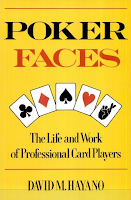The Perils of Learning As You Go
 I’ve written here before about David Hayano’s 1982 book Poker Faces: The Life and Work of Professional Card Players. It’s an anthropological study of professional poker players (of many different varieties) who populated California card rooms during the 1970s and early 1980s.
I’ve written here before about David Hayano’s 1982 book Poker Faces: The Life and Work of Professional Card Players. It’s an anthropological study of professional poker players (of many different varieties) who populated California card rooms during the 1970s and early 1980s. While the book’s conclusions regarding that particular generation of players are dated in some respects -- having been drawn well before the “boom” and the full-blown revolution that followed -- there remain a number of relatively timeless observations and insights that still readily apply to poker players today.
For a detailed overview of what Hayano covers in Poker Faces, click here to see that earlier post. Today I just wanted to share one observation Hayano makes early on in his study, something I came across earlier this week while rereading. Something about this particular point Hayano makes resonated a little differently with me when I read it this time.
The point comes up in a section titled “Background to a Gambling Career,” a short prelude to the categorization of different types of professionals Hayano subsequently makes. Here Hayano talks about how frequently those who become full-time pros often do so by happenstance, sort of “falling” into the profession after perhaps growing up with the game and experiencing some success during early trials as an adult.
 There are a few early “catalysts” -- “adolescent gambling,” “work dissatisfaction,” and a wish for the “freedom to control their own time and money” among them -- that often characterize those who become full-time players. But in most cases, Hayano notes, there isn’t really any sort of formal decision or plan to become a pro. It just kind of happens.
There are a few early “catalysts” -- “adolescent gambling,” “work dissatisfaction,” and a wish for the “freedom to control their own time and money” among them -- that often characterize those who become full-time players. But in most cases, Hayano notes, there isn’t really any sort of formal decision or plan to become a pro. It just kind of happens.To put it in the anthropologist’s terms, somewhere along the way the pros “have self-socialized themselves into full-time playing with little outside help and almost no deliberate anticipatory socialization.”
That was the observation that struck me this time around, this idea that people who become full-time players generally do so without a lot of forethought, without a lot of guidance, and without a lot of formal “training” or the kind of apprenticeship that characterizes many other professions. And perhaps unsurprisingly, many find themselves struggling down the road when subsequently faced with situations for which they are necessarily ill-prepared.
This is one of those ideas Hayano advances in his study that I think still applies more or less today. And I guess when I think about the utter mess online poker has now become in the U.S., highlighted of late by the Full Tilt Poker fiasco, it is interesting to think about the role played by the pros who started that company. And how it was probably the case for many of them that they hadn’t any real preparation for managing their own lives as professional players, let alone other entrepreneurial ventures such as creating and running an online poker site.
Bill Rini wrote an insightful post yesterday exploring in particular “How Things Became So Screwed Up At Full Tilt Poker.” He speculated some about how it happened that a bunch of smart folks (in his opinion) allowed things to go as wrong as they did there. As he notes near the conclusion, he doubts those who ran FTP “specifically set out to defraud anybody of their money,” adding “it just doesn’t fit with their personalities.”
But it appears that’s just what they ended up doing. (Like Bill, I'll acknowledge the “alleged” qualifier here.) And while doing so perhaps didn’t fit with their personalities, it does kind of fit with the idea Hayano presents of poker pros often having to learn as they go -- a kind of modus operandi that often characterizes the early stages of their playing careers, the self-tutelage required to manage their professions afterwards, and beyond.
Labels: *by the book, Bill Rini, David Hayano, Full Tilt Poker














0 Comments:
Post a Comment
<< Home